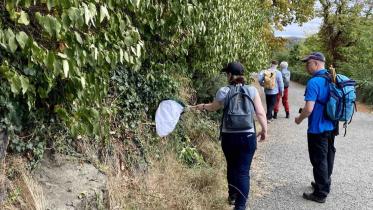Peatland ACTION - Procurement Guidance for Applicants, Statement of Requirements template, and scoring and evaluation matrix.

The procurement guidance sets out the requirements for projects preparing to submit an application to NatureScot Peatland ACTION.
The Statement of Requirements for peatland restoration downloadable template is to be used as a guide by those seeking tenders for NatureScot Peatland ACTION restoration work on the Public Contracts Scotland’s (PCS) portal.
A tender scoring and evaluation matrix is also available for download.
Peatland ACTION - Procurement Guidance for Applicants
This guidance note sets out the procurement requirements for projects preparing to submit an application to NatureScot Peatland ACTION. Procurement expectations are already included in our Standard Terms and Conditions of Grants, available on our website. This guide clarifies specific requirements, sets out the evidence NatureScot will ask to see, and signposts to resources that can support projects less experienced in procurement processes.
This guide does not constitute procurement advice for your organisation and undertaking procurement in grant funded projects is the applicant/recipient’s responsibility. We will be happy to respond to any queries, which should be directed to peatlandactiongrant@nature.scot
The term ‘contract’ throughout this guidance covers the 3 types of contracts you may have to procure within your Peatland ACTION project:
- Supply Contracts – for the purchase, lease, rental or hire purchase of products and goods such as materials, for example geojute and coir logs
- Service Contracts – for the provision of services such as consultancy
- Works Contracts – for the design and undertaking of ground works such as peat bank reprofiling or drain blocking
Procurement and public bodies
This Peatland ACTION procurement guidance note does not apply to public bodies. The Public Contracts (Scotland) Regulations 2015 apply to contracts being tendered and let by public bodies. Public bodies include central, regional and local authorities, bodies governed by public law and associations formed by one or more of these authorities or bodies. A full definition of a body governed by public law can be found in Annex 1. This includes the circumstances within which organisations such as charities or trusts would be subject to the regulations. NatureScot will not advise on your organisation’s status.
Procurement principles
The key principles of public sector procurement of being able to demonstrate openness, fairness, transparency and equal treatment when purchasing goods, services or works using public funds apply. Peatland ACTION awards public funds therefore the principles above must be applied to procurement exercises in successful projects. Open procurement can bring wider benefits to your project and to our funding programmes through working with and supporting a wider and more diverse range of contractors, some of whom may be new and offer different insights and approaches. As well as these key principles, it is also essential to demonstrate that value for money has, or will be, achieved.
Approving Peatland ACTION Contracts
Undertaking procurement exercises are the responsibility of the grant applicant prior to application. As part of our assessment, we will review the procurement process undertaken to ensure that it meets our expectations. Contracts can only be awarded with our approval and on receipt of a Grant Offer.
Thresholds and Competition Requirements
Meeting our competition requirements is essential in demonstrating that the procurement principles have been met. Table 1 below sets out our minimum expectations. The table also sets out what further information and approvals may be required if you are unable to meet the minimum competition requirements.
Note: A Single Tender Action (STA) – where you intend to ask only one supplier to quote/tender - is covered elsewhere in this guidance. Receiving only one quote when you have invited several, or openly advertised, is not an STA situation.
Table 1a - Peatland ACTION Thresholds and Minimum Competition Requirements – for all groundworks
Public Contracts Scotland (PCS) MUST be used to advertise all contract tender opportunities and MUST be used for receiving tenders for all contracts of £50k and over, inclusive of VAT.
Purchasing thresholds including any non-recoverable VAT | Minimum Competition Requirements | Further information and approvals that will be required |
|---|---|---|
| Up to £50,000 | Advertise and full procurement tendering exercise |
|
| £50,000 and above | Advertise and full procurement tendering exercise |
|
Table 1b - Peatland ACTION Thresholds and Minimum Competition Requirements – for all other supply and service contracts
Public Contracts Scotland (PCS) MUST be used to advertise all contract tender opportunities and MUST be used for receiving tenders for all contracts of £50k and over, inclusive of VAT.
Purchasing thresholds including any non-recoverable VAT | Minimum Competition Requirements | Further information and approvals that will be required |
|---|---|---|
| £1,000 and below |
| None |
| £1,000 to £25,000 |
|
|
| £25,000 to £50,000 | x 5 Written Quotes a minimum of 5 suppliers to be invited to quote |
|
| £50,000 and above | Advertise and full procurement tendering exercise. |
|
Requests for approval noted above should be sent directly to your Funding Officer. We will aim to respond to approval requests within 5 working days but it may take longer - you should ensure sufficient time is factored into your procurement and application processes.
If you have your own procurement policy and would wish to procure on a different basis from the thresholds above you must get our prior approval. Your policy should be submitted for approval prior to starting any procurement exercise. We will review whether your policy offers a level of threshold competition that is comparable with our minimum requirements and will confirm our approval, or otherwise, to you in writing.
Options for sourcing quotes and tenders
Options for sourcing quotes are shown below.
Public Contracts Scotland (PCS)
To allow you to reach as wide a pool of potential contractors and suppliers as possible, we encourage use of the Scottish Government’s Public Contracts Scotland (PCS) portal. The PCS portal is widely used by the public sector organisations to publicly advertise, tender and let new contract opportunities. It is our preferred approach and can be used for a full range of contract values.
Use of PCS is a firm requirement for contracts above £50k with the exceptions noted in Table 1. For contracts over £50k advertised via PCS, you may simultaneously source quotes/tenders by other means to further broaden reach however you must be very clear about all the platforms being used simultaneously to invite quotes and receive responses in each option that you use. You must also ensure that the information available to potential suppliers is exactly the same with the same date and time given as the deadline. (Example: if you place a contract opportunity on PCS but also on your social media account, in both of those places you must be clear that the opportunity is also available on PCS/social media (as relevant) and that responses can be made via PCS or by email).
If you have advertised openly on the PCS portal, there is no minimum number of tender bids or quotes that you need to receive. However, as outlined in Table 1, in most instances you will need approval to let a contract where only one has been received.
The PCS portal has a range of information and support guides on the website as well as a dedicated Customer Service Team that can be contacted by email or telephone. The details are available on the website link above. Important: To use the PCS portal, you will first need to register free as a ‘buyer’ via the PCS portal: Public Contracts Scotland - Register as a buyer. If you have any difficulty registering as a non-public body, you should email the PCS Customer Services Team confirming you are applying to Peatland ACTION, funded by Scottish Government, and are required to use the portal.
Peatland ACTION can provide some PCS support. Please contact your Funding Officer if you need any assistance.
Public Contracts Scotland ‘Quick Quote’ facility
Quick Quote is an online quotation facility that enables you to obtain competitive quotes electronically. It enables you to search suppliers that are registered with PCS and directly invite them to submit a quote.
Further information can be found on the PCS website link above and in the Public Contracts Scotland - Quick Quote User Guide
Directly email suppliers to invite a quote
For contracts under £50k, if you are not using the PCS portal, we need to be confident that the opportunity to quote for a contract is open, fair and transparent. It is our expectation that the number of quotes required in each of the procurement thresholds is achieved. This means that you may have to invite bids from a greater number of contractors to be confident in receiving the number required. Potential suppliers and contractors could be identified through:
- experience and knowledge from other projects you have been involved in
- making contact with projects who have done similar things
- recommendations from project partners or stakeholders
- on-line searches
We understand that securing quotes from suppliers can sometimes be challenging. If you request approval to award a contract where the minimum competition requirements have not been met, we will ask you to provide evidence of all your efforts to secure quotes. It is therefore important that you save all emails that you send and receive, including those where a supplier or contractor has declined. Evidence requirements are fully covered further on in this guidance.
When inviting quotes or tenders it is important that you provide potential suppliers and contractors with sufficient information to enable them to provide you with a detailed and accurate quote or bid. All potential contractors must receive the same information to ensure equal treatment.
Advertising
If you choose not to advertise contracts under £50k on the PCS portal, you may choose to advertise them elsewhere. This is likely to have a more limited reach and would best be used in parallel with a direct invite to potential suppliers and contractors as above. As already noted, if you are advertising a contract opportunity in more than one place, this must be made very clear in each of the advertisements. Options for advertising include:
- your website and the project website if you have one
- your social media platform and those of your project partners if you have one
- trade journals or other sector newsletters
For contracts over £50k, you may use social media or your website to advertise that a contract opportunity has been advertised on PCS, advising any interested suppliers to submit a bid via PCS.
Single Tender Actions
By exception, we will consider a Single Tender Action (STA) request which will require you to submit a Single Tender Justification (STJ) for approval. NatureScot will provide a template for this.
A Single Tender Action is where you invite only one supplier or contractor to quote or bid for a contract. It also covers situations where a landowner, who may or may not also be the grant applicant, is proposing to undertake works as a contractor. An STA should not be confused with situations where you advertise or invite multiple quotes/bids but receive only one – those instances are covered by the competition requirements and approvals set out in Table 1.
Your STJ must provide a strong case as to why your preferred contractor is the only one able to meet the requirements of the contract. It must explain:
- why you will not seek other quotes or openly advertise the opportunity, including why you don’t intend to use PCS.
- other contractors you may have considered and why they will not be approached
- the assessment that you will undertake, and evidence you will gather, to be assured of a fair market price and value for money.
All single tender situations must be considered and evaluated by us before you begin the procurement process. Our primary assessment of your STJ request will be on the rationale for not seeking or inviting others to quote or bid, not simply the merits of your preferred supplier or contactor.
For all approved STA cases, you must receive a quote or tender from your preferred supplier or contractor.
Common STJ requests
We understand that there are situations where an STA may be required, for example very specialist skills or equipment required, but there are no situations where an STJ will automatically be approved. The following reasons will not guarantee approval in their own right:
- Current or previous experience with a contractor
- An organisation having a preferred supplier or contractor list
- Contractor involved in application development
- Not knowing of a sufficient number of contractors to meet the minimum competition requirements
- Remote or island location
- Value of contract
- Environmental sustainability (for example in materials or transport to site)
- Distance from the project site(s)
- Supporting local economy
- Limited time due to seasonality of activities
In an STA situation, if you have already sought a quote or bid from a preferred supplier or contractor prior to your application being submitted or have one ‘on hold’ subject to our decision, you cannot assume that we will approve your STJ. If you are requesting Peatland ACTION funds to pay for or contribute to the contract, you must be prepared to undertake a new procurement exercise and ensure this flexibility is built into your project delivery timescale. The quote or bid should be attached to your STJ when submitted for approval.
Evidence of your procurement
If goods, services, or works have been, or will be, purchased using Peatland ACTION grant funding, it is essential that you maintain a full audit trail of procurement Documents of Evidence. Annex 2 sets out the Documents of Evidence that you are required to retain.
Procurement evidence may be required in support of claims for payment and for any approvals you may request in relation to the minimum competition requirements in Table 1. The Grant Offer we make to you will set out any evidence required and when it should be provided. Any procurement evidence is additional to the financial information and records you are required to keep as set out in our Financial Information and Records Guidance available on our website.
Procurement templates
The Scottish Government’s Procurement Journey provides online guidance and templates for public sector procurement and these can also be used by Peatland ACTION projects. It covers key parts of a procurement exercise such as preparing a brief and offers an evaluation scoring matrix for lower and higher value contracts.
Annex 3 provides links to key procurement templates taken from the Procurement Journey that you can use or adapt for your own project needs. These are aimed at public sector contracts up to £50k however they will be helpful for Peatland projects of all values. You do not need to use these templates, though we encourage you to read the guidance and use templates as much as possible. We have added a Statement of Requirement Template and an Evaluation and Scoring Template for restoration projects at we encourage you to use.
Minimum quote/tender requirements
Irrespective of the route used to secure quotes and tenders there are basic elements that every quote/tender bid needs to show. These confirm that the quotes/tenders are current, accurately reflect what is being proposed in the project, accord with the project application form and enable invoices to be matched to the costs and requirements when funds are being claimed.
The minimum requirements are that:
- quotes/tenders are addressed to you (as the applicant) or your appointed agent
- quotes/tenders are dated and signed where relevant
- quotes/tenders are in written or printed form and clearly originate from a reputable contractor who can deliver the goods/services
- the contractor's contact and business details are clear and legitimate - on business headed notepaper and including their companies’ registration number where relevant
- quotes/tenders are based on the same specifications as described in the application
- tenders are fully itemised, with a schedule that provides a breakdown of costs for each of the main stages of the work or for the individual items to be supplied
- quotes/tenders are compliant with the Statement of Requirements
- there are no missing elements
- there are no ineligible elements
- cost calculations are up to date, correct and precise
- quotes/tenders should confirm for how long they are valid
- all pricing should be net of VAT, with any VAT clearly shown separately
- evidence that the contractor can deliver the work to the required timescales.
Where appropriate, your quotation/tender documentation should ask bidders to include in their submissions details or copies of their Health & Safety Policy Statement and Insurance requirements, such as, Public Liability, Professional Indemnity and Employer’s Liability. Where appropriate and proportionate, bidders should also be asked to submit a sustainability policy if they have one. Bidders should also be asked to include evidence of compliance with the Scottish Government Fair Work First policy (see below).
Evaluating and Scoring Quotes / Tenders
This stage of the procurement process has become the subject of much scrutiny and criticism in recent years. The Freedom of Information Act (Scotland) 2002 has led to a notable increase in the level of documentation relating to the evaluation of quotes/tenders being released into the public domain, and it is your duty to ensure that any procurement process can withstand such scrutiny.
This stage of the process ensures that:
- the contract award decision is objective
- the decision-making process is fair, transparent and auditable
- you can demonstrate that value for money (not just in terms of price) has been obtained.
It is important that the evaluation process is robust, regardless of contract value, in order to provide a full audit trail of how an award decision was reached. You are required to submit your procurement scoring matrix as part of your application – in some cases we may ask to become involved in your evaluation and scoring exercise.
Annex 4 sets out basic procurement good practice that includes some ‘dos and don’ts’ for evaluating and scoring.
What happens if our procurement requirements aren’t met
Meeting the public sector procurement principles is a condition of receiving a grant from public funds and it is important that you fully understand what steps we will take if your procurement practice does not meet our expectations. We may:
- ask you to undertake a full procurement exercise
- for example, where you progressed a Single Tender Action but it was not approved
- ask you to re-do a procurement exercise
- for example, if you are unable to provide the procurement evidence that we ask for
- delay a grant payment
- for example, if evidence is incomplete or missing
- reject your application or give an offer ‘in principle’, subject to a new procurement exercise
- for example, if you enter into a formal contract prior to receiving and accepting a formal offer of funding from us
We encourage you to think about your procurement needs and how you will meet the minimum competition requirements as early as possible in your project planning. Your project is at risk of being rejected for funding if you gather quotes or tenders in advance and are unable to provide the level of supporting evidence outlined in Annex 2.
Fair Work First
Fair Work First is the Scottish Government’s flagship policy for driving high quality and fair work across the labour market in Scotland by applying fair work criteria to grants, other funding and contracts being awarded by and across the public sector, where it is relevant to do so. From 1st July 2023, grant applicants will be asked to verify their Fair Work First commitment - payment of the real Living Wage and an effective worker’s voice criteria are mandatory. You may also be asked to demonstrate how your procurement and contract management processes meet the Fair Work First criteria.
Further information can be found on our website: Fair Work First - guidance for funding applicants
Sustainable Procurement
Sustainability comprises the environmental, social and economic aspects of goods, services and works bought by Peatland ACTION projects as part of overall best value. Further information on Sustainable Procurement in NatureScot is available on our website and this will help you to consider how you can relate these expectations to your project: Sustainable Procurement in NatureScot
As a minimum, you should consider the following Generic Sustainability Criteria in your Peatland ACTION procurement exercise(s) where relevant:
- Low carbon emissions
- Low resource use – for example materials, energy, transport, paper
- Recycled or re-used materials
- Fair Trade or Ethically-produced products, where they exist
- Less waste produced and easy to recycle. Please note: Peatland ACTION discourages use of single use plastics
Ethical Procurement
It is the responsibility of grant recipients to ensure compliance with all domestic and European legislation and regulations relevant to the Project as set out in our Standard Terms and Condition of Grant available on our website. In addition to Fair Work First and Sustainable Procurement, applicants and recipients are advised to ensure their procurement practice considers ethics and human rights. Further information can be found at:
- Human Trafficking and Exploitation (Scotland) Act 2015 – UK Government Legislation 2015
- United Nations Human Rights Guiding Principles on Business and Human Rights
United Nations Guiding Principles on Business and Human Rights
Procurement and Recruitment
If your project requires the appointment of paid staff, whether full or part time, and it is your intention to contract rather than directly employ onto payroll, then the minimum competition requirements set out in this guidance must be met.
Direct employment of paid onto payroll staff falls out with the scope of procurement guidance but for clarification, the following summarises our recruitment expectations for grant funded projects:
- All posts must be openly and fairly advertised. We may ask to see evidence of the recruitment exercise you undertook or to become involved in the recruitment process.
The following exceptions can apply without the need for approval:
- Existing paid members of staff may be moved into the post if they have the necessary skills and experience. In the terms of any Grant Offer we may ask to see evidence of their suitability and to approve their appointment in advance
- Existing paid members of staff may have their hours increased to enable them to work for the project. As above, in the terms of any Grant Offer we may ask to see evidence of their suitability and to approve their appointment in advance
You must seek our approval in advance if:
- You are a family or small business and you wish to appoint a family member or friend to a grant funded post
- You wish to appoint a volunteer to a paid post
- You wish to move a contractor into an employed post
Annex 1: Public Contracts (Scotland) Regulations 2015: Definition of public bodies
A "body governed by public law" is defined in regulation 2 of the 2015 Regulations as:
a body that has legal personality, is established for the specific purpose of meeting needs in the general interest, not having an industrial or commercial character and which:
(a) is financed for the most part by the State, regional or local authorities, or by any other body governed by public law;
(b) is subject to management supervision by any such authority or body; or
(c) has an administrative, managerial or supervisory board more than half the members of which were appointed by any body referred to in sub-paragraph (a).
A charity will only meet the first element of the definition if it has a separate legal personality (such as a company limited by guarantee or a Scottish Charitable Incorporated Organisation (SCIO)) and is carrying out non-industrial or commercial functions to meet the needs in the general interest. A charity or public trust may well be regarded as carrying out non-industrial or commercial functions to meet needs in the general interest, but it is unlikely that a private trust would.
Due to the requirement for a separate legal personality, an unincorporated charity or trust is unlikely to be caught by that definition. Even where a charity is caught by the first limb of the test, it will only be subject to the public procurement rules if it receives the majority of its funding from central, regional or local authorities or other public bodies or is subject to some form of control or ownership by such an authority/body as set out in (a) to (c) of the above definition.
Where a charity or trust does not fall within the definition of a body governed by public law then it is not caught by the public procurement rules and procurement exercises cannot be challenged under the 2015 Regulations. A private charity or trust, therefore, can determine its own procurement policy and processes which need not go beyond what is proportionate to its size and purpose(s).
Annex 2: Procurement Documents of Evidence
If goods, services or works have been, or will be, purchased using Peatland ACTION funding, it is essential that you maintain a full audit trail of procurement Documents of Evidence.
Documented evidence will also be required where there has been:
- modifications / changes to the original contract
- changes to the original agreed price
- contract meetings post contract award - written minutes/notes of any meetings or site visits
| Contract Documentation Required/ Procurement Steps | Documents of Evidence |
|---|---|
| What has been purchased? | A summary of goods, services or works purchased |
| Finding Suppliers – Pre-qualification/Market Research |
|
| Suppliers Invited to Quote/Tender (ITQ / ITT) | Company Names & details of supplier invited to quote/tender |
| Invitation to Quote/Tender Issued (ITQ/ITT) | Provide copies/screenshots of ITQ/ITT issued to all suppliers |
| Statement of Requirements (SoR)/ Project Brief/Specification Issued | Provide a copy of the SoR/project brief/specification issued with the ITQ / ITT |
| Any other tender documentation issued with ITQ/ITT | If applicable provide copies of any other tender documentation issued with the ITQ/ITT |
| Site Visits/interviews etc. | If applicable provide details of any site visits, interviews etc. that took place |
Questions asked by Tenderers Responses Provided | Provide copies/details of any questions asked by bidders during the quotation/tendering exercise and responses given. |
| Record of all Quotations/Tenders Received |
|
| Evaluation Panel Name(s) | Provide names of panel who evaluated quotes/ tenders |
| Quotes/Tenders Received |
|
| Evaluation Scoring Matrix – fully completed |
|
| Clarification Meeting(s) | If applicable provide copies/details of any clarifications that were sought from bidders |
Signed Contract Offer/Award Letter/Agreement (letter should be signed by both parties) |
|
| Unsuccessful Notifications Issued | Provide copies/screenshots of the notifications/letters issued to unsuccessful bidders |
| Successful Tenderer/Bidder’s Quote/Tender | Provide a copy of the Successful bidder’s Quote/ Tender submission |
| Final Agreed Contract/Purchase Value |
|
| Complaints etc. Received | If applicable, provide details of any complaints received and dealt with during the quotation/tendering exercise |
| Contract Award Recommendation Report (CARR) | A CARR can be a useful document to describe the procurement process you have undertaken. These are not required as standard. |
Annex 3: Procurement templates
The following table includes templates from the Scottish Government’s Procurement Journey 1. It also includes a scoring matrix from Procurement Journey 2 which is intended for higher value contracts and will be helpful for higher value Peatland ACTION contracts.
| Document | Link |
|---|---|
| Invitation to Quote (Template) |
|
| Prepare a Brief Document (Template) | Statement of Requirements (SoR)/Project Brief/Specification – the detail of your SoR/brief/spec may vary depending on the complexity of the purchase. A template Peatland ACTION SoR is available for use for restoration works. The relevant terms and conditions of your Peatland ACTION Award letter should be included in the SoR so that potential contractors are fully aware of the information they will need to provide to you when you claim for funds for example, detailed invoicing. IMPORTANT TO NOTE: Award Criteria & Weightings - the SoR/brief/spec must include the evaluation award criteria and weightings that will be used to evaluate, score and select the successful supplier(s). A template Peatland ACTION Tender Scoring and Evaluation Matrix is available for use for restoration works. Question & Answers Deadline – it is essential to include the date & time by which all Q’s & A’s must be submitted by. Please note: Once the ITQ/ITT is issued suppliers may ask questions about it. Regardless of the nature of the question(s), your responses should be issued to every supplier invited to quote/ tender. This would be by email in response to an emailed ITQ/ITT or by via the Quick Quotes facility if the ITQ/ITT was made by using Quick Quote. DO NOT disclose the identity of the individuals/companies submitting questions. Quotation/Tender Submission Deadline – it is essential to include the date & time quotes / tenders must be submitted by. |
| Declaration of Interest (Conflict(s) of Interest) (Template) |
|
| Record of Quotations Received (Template) | It is essential a record of all quotation/tender documentation is maintained |
| Evaluation Process & Guidance (Template) (Scoring Matrix) | Evaluation Process and Guidance Template A simple scoring matrix which can be used for purchases with a value of below £50,000. A template Peatland ACTION Tender Scoring and Evaluation Matrix is available for use for restoration works. Please see below for further information on ‘Evaluating & Scoring Quotes/Tenders’ received |
Evaluation Process & Guidance (Template) (Scoring Matrix)
| This evaluation scoring matrix can be used to evaluate and score purchases with a value of over £50,000. A template Peatland ACTION Tender Scoring and Evaluation Matrix is available for use for restoration works. |
| Contract Award Letter (Template) |
|
| Unsuccessful Quotation Letter (Template) | Providing Feedback – see also Annex 4 for further information and guidance on what information about the quotation/tender exercise should & shouldn’t be shared |
| Recommendation Report (details of content) | A report that summarises your findings, scoring and recommendation from a procurement exercise.
|
Annex 4: Good practice in evaluation and scoring
The following offers some basic guidance in relation to evaluating and scoring quotes/ tenders received, including some ‘dos and don’ts’.
- An evaluation panel can consist of one person, but it is recommended that wherever possible, two or more people are involved.
- Evaluation panel members can either score independently and use an average for each ‘final’ score or meet together for a ‘moderation meeting’ so that there is only one set of agreed scores. If using the latter method, it is important that any panel member does not feel unduly coerced into agreeing a particular score.
- Evaluators Comments should include any particular aspects of the bidder’s quote/tender that were judged to be good/excellent/poor.
- Comments should be kept constructive as you may be asked for feedback from unsuccessful bidders or tendering documentation may be subject to FOI requests.
- Clarification of any aspect of a submitted quote may be necessary during the evaluation process. If you need to seek clarification, please bear in mind the following:
- It should be done in writing, and a specific timeframe for response should be given
- All communication with bidders must be properly recorded so that an audit trail is maintained
- Clarification should not become negotiation, which is not allowed under the procurement procedures normally used by public sector organisations
- You should take care to treat all suppliers equitably throughout the entire process.
| Do | Don't |
|---|---|
| Note any points that are unclear or may require clarification from bidders | "Read between the lines" or make assumptions – check with the bidder if unsure |
| Read the submission at face value and score only on the basis of the information provided | Make changes to the evaluation criteria during this process (including adding sub-criteria not detailed in the SoR). The criteria and weightings must be as set out in the SoR |
| Keep a note of ‘back-up’ comments that help justify scores allotted when evaluating – this can assist when providing feedback to bidders | Give one bidder the opportunity to clarify something but not another – treat them all fairly as this ensures you can’t be challenged |
Providing Feedback
The following information may be disclosed when providing feedback to unsuccessful bidders:
- How many quotes were received
- How many suppliers were invited to quote
- The overall price of the winning bid (but not any price breakdown or daily rates etc.)
Any feedback requested from an unsuccessful bidder should focus on their quote and not offer detail of any of the other quotes as you could unintentionally disclose commercially sensitive data. Constructive feedback can help suppliers improve their performance in future competition and it is advised any feedback given is provided by email rather than by phone.







